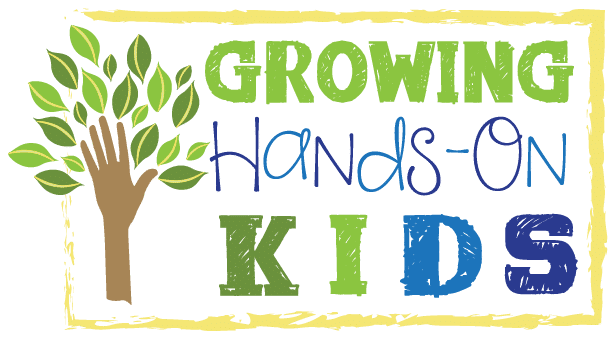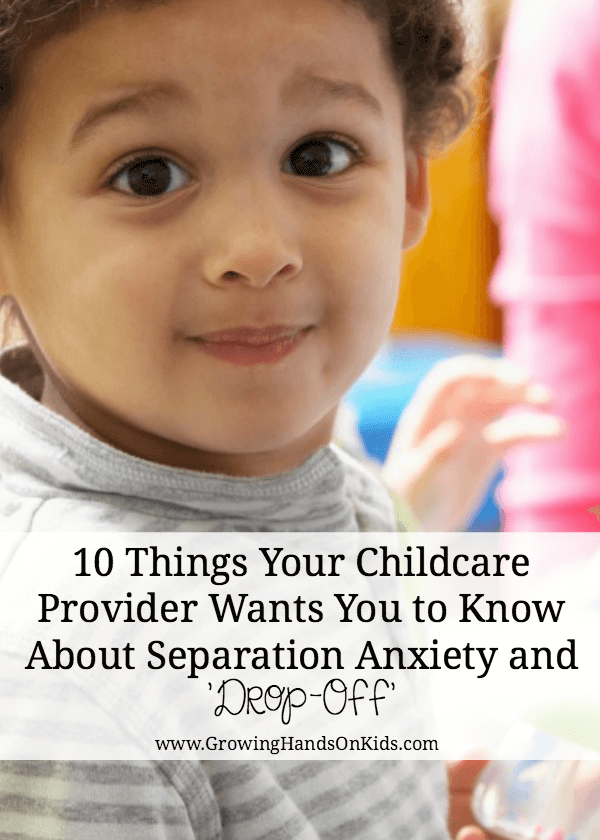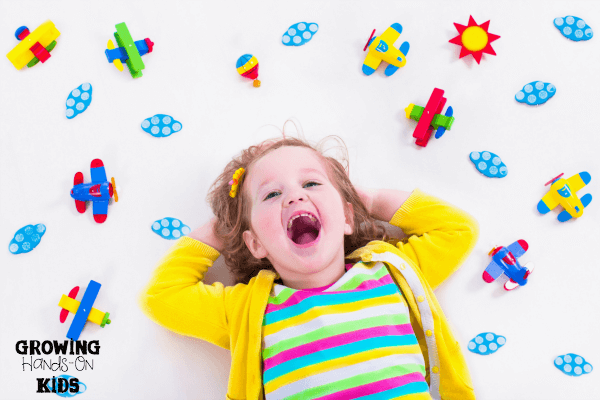10 Things Your Childcare Provider Wants You to Know About Separation Anxiety and ‘Drop-Off’
Affiliate and Referral links are used below to promote products I love and recommend. I receive a commission on any purchases made through these links. Please see my disclosure policy for more details. As an Amazon Associate, I earn from qualifying purchases.
I want to welcome Sara of Sunshine Whispers today to GHOK. She is going to be sharing some tips that your childcare provider wants you to know about separation anxiety and the dreaded “drop off.”
There I was, sitting in the parking lot of my daughter's school, trembling. I didn't understand why my daughter was so upset. I mean, we had an amazing weekend. As usual, I had orchestrated a great one, complete with fun crafts, a trip to the zoo, piles of books, and even a few rounds of ‘Hungry Hungry Hippos.' She was fine when she woke up this morning. We sang the alphabet song as I got her dressed, and she shared her baggie of Cheerios with Minnie Mouse as we listened to Laurie Berkner in the car on the way to school. Then, it happened.
The ‘eruption.'
As soon as we approached her classroom, she started wailing: full on, thermo-nuclear screaming. My 2-year old gave the performance of a lifetime, intended for an audience of one: me. I left her school on the verge of tears myself. As I tried to regain my own composure before heading off to the demands of work, I was flooded both with doubts about my life choices, and anxiety about the mental anguish I was putting my little girl through.
The quickest way to become consumed with ‘working Mom guilt' is to attempt daycare drop-off with a toddler.
The Dreaded Drop-Off
Very few parents like dropping their kids off at school. As Moms, even when things go smoothly, we still long to be with our children. When separation anxiety is added to the mix, the result can be catastrophic for both parents and kids. Fortunately, your childcare provider or preschool teacher has pretty much seen it all. They are very willing to work with you to ease the transition for your toddler or preschooler. Here are a few things your child's teacher wants you to know about separation anxiety and the dreaded drop-off:
Like with many other phases of early childhood, separation anxiety during drop-off is only temporary. Every kid is different. However, most kids seem to be most vulnerable to drop-off anxiety from age 1 to 3.
Sometimes the struggle is real, sometimes it is all show. Here are some tips to smooth the transition if your child really is having a hard time:
- Let them bring a security item into the classroom: This could be a favorite stuffed animal, a blanket, or a small toy. The point is to make your kid more comfortable about being somewhere that isn't home.
- If your kid's classroom allows it, bring in a picture of the family to hang in the classroom where they can see it.
- Routines matter: Try to keep your morning schedule the same every day. This will help your young child know what to expect. Many times, separation anxiety can be attributed to a disruption in the child's life, even a small disruption. Establishing a routine schedule can mitigate that anxiety.
- Spend a little more time with them in the morning: Spending even 5 more minutes with your kid in the morning can provide enough comfort to alleviate much of their anxiety.
- Do a hand-off with your child's teacher: Clearly, your childcare provider is your partner. One of their priorities is to learn what makes your kid tick. They know how to best redirect an emotional child to an activity they will love. They also know how to avoid triggers that will cause anxiety to escalate. Communicate with the teachers every day. If your child is tired, not feeling great, or is a little cranky pants, let their teacher know in the morning and the teacher will undoubtedly flex their approach to compensate.
- Say a proper goodbye: Our daughter's school has windows in each of the classrooms. Part of our morning routine is to ‘say goodbye at the window.' This has happened every day since our daughter was 1-year old. We also make sure to hug, give kisses, and say ‘I love you.'
Tips for dealing with the transition when the struggle is ‘all show.'
- Talk with the teacher. If you ask, your kid's teacher can tell you if your child is genuinely suffering or if they are just ‘playing you.' I cannot tell you how many times I have left my daughter wailing in the classroom, only to have her friend's Mom tell me that within 30 seconds of me leaving, the tears had dried up and she was happily playing with the other kids in the class. By the way, I asked my husband if this was something he dealt with a lot…. he had no idea what I was talking about. Clearly, my precocious little girl knew all my buttons and how to most effectively push them. I suspect this is a common theme with Moms.
- Call the childcare center to check in. You can do this regardless of whether or not you think your child's separation anxiety is real or faked. When in doubt, call the school. Almost every time, you will be reassured that your kid is happily engaged in whatever activity is going on.
- Just leave. When your kid's drop-off anxiety is more fiction than fact, the absolute best thing you can do is quickly say goodbye (don't forget that routine) and then leave. Just go. Lingering and obsessing about the transition (something I did a lot), will only exacerbate the situation. Your kid's teachers are pros at getting your preschooler involved in an activity that has likely been selected just for them.
Before you know it, your work day will end. Then, you will get to experience the best part of the day… the reunion!
So, hang in there Mom. It will be ok. Separation anxiety during drop-off does not last forever, and chances are it is way worse for you then it is for your kid.
Thanks for reading!
Sara
Sara is a mom who loves God, loves her family and friends, and loves to have fun! She is seeking the ever elusive work-life balance and having a blast keeping up with a beautifully spirited little girl! You can find her blog at Sunshine Whispers and on Facebook, Pinterest, and Instagram.

Heather Greutman, COTA
Heather Greutman is a Certified Occupational Therapy Assistant with experience in school-based OT services for preschool through high school. She uses her background to share child development tips, tools, and strategies for parents, educators, and therapists. She is the author of many ebooks including The Basics of Fine Motor Skills, and Basics of Pre-Writing Skills, and co-author of Sensory Processing Explained: A Handbook for Parents and Educators.




I really like your tip to do a hand-off with the teacher. A great way to do this is to make sure and introduce the child and teacher to each other on the first day of class. That way everything will be a little bit less foreign to your little one and reduce the crying.
My son is about to start going to day care and I’m worried that he’ll deal with separation anxiety. However, I really like your idea about having him bring a security item. He has a stuffed dog that he absolutely adores, and so I think that I’ll talk to his teacher about letting him bring that with him so that he’ll be comfortable.
My sister has been thinking about taking my nephew to a daycare sometime soon. However, she is really anxious about leaving him at a day care. So, I liked your advice about just leaving the day care and not make a big fuss. It does seem like a good thing for her to do.
I really like the idea to make sure that you’re getting into a routine. Kids really do have a problem when their routines are interrupted, and all of these tips I feel like contribute to making that transition easier. Working with the child care provider is the key, I think, and I agree that all of these things can make a positive influence on them. Thanks for sharing!